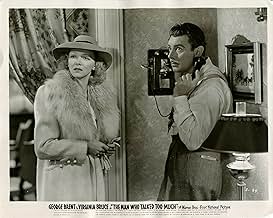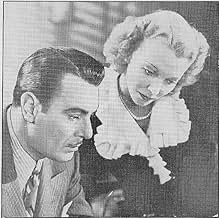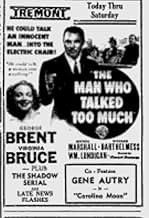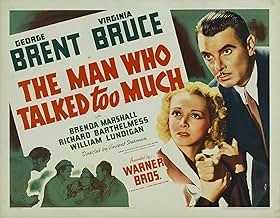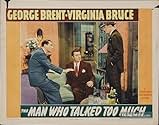Adicionar um enredo no seu idiomaA DA quits after wrongly convicting an innocent man. His secretary joins his new law firm, which prospers through mob ties. His brother John joins but discovers corruption and helps the feds... Ler tudoA DA quits after wrongly convicting an innocent man. His secretary joins his new law firm, which prospers through mob ties. His brother John joins but discovers corruption and helps the feds, leading to his own false murder conviction.A DA quits after wrongly convicting an innocent man. His secretary joins his new law firm, which prospers through mob ties. His brother John joins but discovers corruption and helps the feds, leading to his own false murder conviction.
- Direção
- Roteiristas
- Artistas
Edwin Stanley
- District Attorney Nelson
- (as Ed Stanley)
Kay Sutton
- Mrs. Knight
- (cenas deletadas)
Avaliações em destaque
I nearly always prefer watching the original film and not remakes. Yet somehow, I have managed to watch both remakes ("The Man Who Talked Too Much" and "Illegal") without yet seeing the first film ("The Mouthpiece")--so I can't really compare the remakes with the original. But, in nearly every case, I do prefer original films and I must knock a point off "The Man Who Talked Too Much" for being a remake.
Of the three leads from these three films, George Brent in "The Man Who Talked Too Much" is probably the most poorly cast. While a fine actor, it is harder to imagine him playing a rather crooked individual--whereas Warren William and Edward G. Robinson are a bit more at home with such roles. Also, I will admit it up front that the plot is really hard to believe. So, to enjoy the film you just have to accept that Brent could be bad and the rest of the plot. If you can't, the film just won't work very well.
The film begins with Brent playing a prosecuting attorney, Stephen Forbes. He convicts a man for murder and is quite pleased with himself--until they learn he was innocent. To make things worse (and HIGHLY contrived), they find out only seconds before the execution and they cannot reach the warden in time to stop it! Forbes is horrified and quits his job--which isn't too surprising. Now in private practice, he has a hard time making ends meet. But, when mobsters find out how talented he is, he immediately becomes a success--to the horror of his younger and very idealistic brother. What follows is amazingly contrived (you just have to see it) but also enjoyable in a brainless sort of way. Not a bad film--but one that could have been better.
UPDATE: I finally got to see the original version, "The Mouthpiece". It's significantly better...and a lot racier!
Of the three leads from these three films, George Brent in "The Man Who Talked Too Much" is probably the most poorly cast. While a fine actor, it is harder to imagine him playing a rather crooked individual--whereas Warren William and Edward G. Robinson are a bit more at home with such roles. Also, I will admit it up front that the plot is really hard to believe. So, to enjoy the film you just have to accept that Brent could be bad and the rest of the plot. If you can't, the film just won't work very well.
The film begins with Brent playing a prosecuting attorney, Stephen Forbes. He convicts a man for murder and is quite pleased with himself--until they learn he was innocent. To make things worse (and HIGHLY contrived), they find out only seconds before the execution and they cannot reach the warden in time to stop it! Forbes is horrified and quits his job--which isn't too surprising. Now in private practice, he has a hard time making ends meet. But, when mobsters find out how talented he is, he immediately becomes a success--to the horror of his younger and very idealistic brother. What follows is amazingly contrived (you just have to see it) but also enjoyable in a brainless sort of way. Not a bad film--but one that could have been better.
UPDATE: I finally got to see the original version, "The Mouthpiece". It's significantly better...and a lot racier!
The Man Who Talked Too Much presumably refers to George Brent, who plays a district attorney who sends an innocent man to the death house. To compensate for his mistake he becomes a struggling defense lawyer, eventually taking on some nasty gangland types in order to make ends meet. The film starts in terrific fashion and is well acted and written throughout, but it eventually bogs down into a standard 'B' plot of frame-ups and revenge. Nevertheless I recommend this to anyone interested in second features, and it certainly has the grit one expects of Warner crime films. Watch for Marc Lawrence in one of his patented bad guy roles.
A man whom Assistant District Attorney George Brent convicted for murder dies in the electric chair. Then Brent discovers he was innocent. So he goes into private practice; it's better that a hundred guilty men go free than an innocent man go to jail. But his clients can't pay their bills. Then along comes gangster Richard Barthelmess, and he pays his bills. But when Brent's brother, William Lundigan, is sentenced to die for a murder one of Barthelmess' hoods committed, can Brent do anything?
It's a remake of 1932's THE MOUTHPIECE, and like many of Brian Foy's B productions, moves along at a good clip. Brent is good in the part, solid if a tad stolid, and backed by a cast that includes Virginia Bruce, Brenda Marshall, George Tobias, and John Litel. But that competent speed never quite reaches the point of panic, and the movie seems lightweight as a result.
It's a remake of 1932's THE MOUTHPIECE, and like many of Brian Foy's B productions, moves along at a good clip. Brent is good in the part, solid if a tad stolid, and backed by a cast that includes Virginia Bruce, Brenda Marshall, George Tobias, and John Litel. But that competent speed never quite reaches the point of panic, and the movie seems lightweight as a result.
As much as Americans express pride in their political and legal system, it is also true that they hold politicians and attorneys in very low esteem. The popular perception of lawyers as unethical and devious is not new and here it permeates this modest 1940 feature. What George Brent does on the screen has little connection to reality (there is one particularly silly scene in which he grandstands by ingesting poison during a murder trial), but sets the stage for his reformation and a happy ending.
The movie flies by so it may be worth 76 minutes of a viewer's time as a reminder of Hollywood's long-standing tradition of disparaging the legal profession.
The movie flies by so it may be worth 76 minutes of a viewer's time as a reminder of Hollywood's long-standing tradition of disparaging the legal profession.
This opens with lawyer George Brent probing a man guilty in court. The guy is sent to prison and is readied for the electric chair. New evidence comes to light: He is innocent. There are frantic attempts to reach the warden. But they;re unsuccessful. An innocent man has been killed as we watch the flicker of the chair.
This all happens in the first few minutes. It's giving nothing away. The rest of the movie involves Brent's deciding to make some money and starting to defend shady characters. His loyal secretary Virginia Bruce goes with him. (What a beauty she was! Such a haunting look.) His brother William Lundigan has graduated from law school. Etc. Brenda Marshall has too small a role. It hops the track but in some ways is an early noir.
This all happens in the first few minutes. It's giving nothing away. The rest of the movie involves Brent's deciding to make some money and starting to defend shady characters. His loyal secretary Virginia Bruce goes with him. (What a beauty she was! Such a haunting look.) His brother William Lundigan has graduated from law school. Etc. Brenda Marshall has too small a role. It hops the track but in some ways is an early noir.
Você sabia?
- CuriosidadesFrank J. Collins based his protagonist on Manhattan defense attorney William Joseph Fallon, dubbed "The Great Mouthpiece" by the 1920's New York press, who had a short but spectacularly successful career before succumbing to the effects of his own dissoluteness at the age of 41.
He has been cited as one of the inspirations for the celebrity lawyer Billy Flynn in the popular musical Chicago. He is also portrayed for six episodes by David Aaron Baker in the HBO television series Boardwalk Empire: O Império do Contrabando (2010).
- ConexõesReferences 20.000 Anos em Sing Sing (1932)
Principais escolhas
Faça login para avaliar e ver a lista de recomendações personalizadas
Detalhes
- Data de lançamento
- País de origem
- Idioma
- Também conhecido como
- El que habló demasiado
- Locações de filme
- Empresa de produção
- Consulte mais créditos da empresa na IMDbPro
- Tempo de duração1 hora 16 minutos
- Cor
- Proporção
- 1.37 : 1
Contribua para esta página
Sugerir uma alteração ou adicionar conteúdo ausente

Principal brecha
By what name was The Man Who Talked Too Much (1940) officially released in India in English?
Responda


